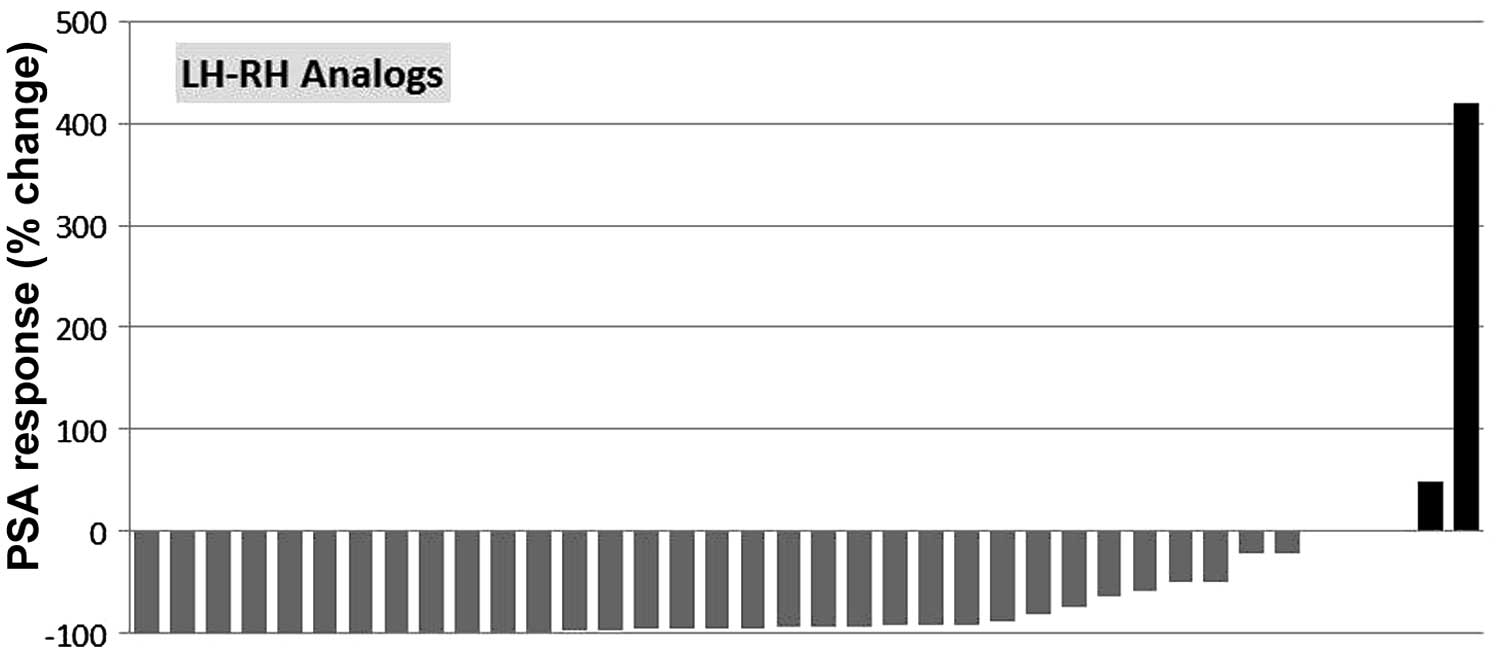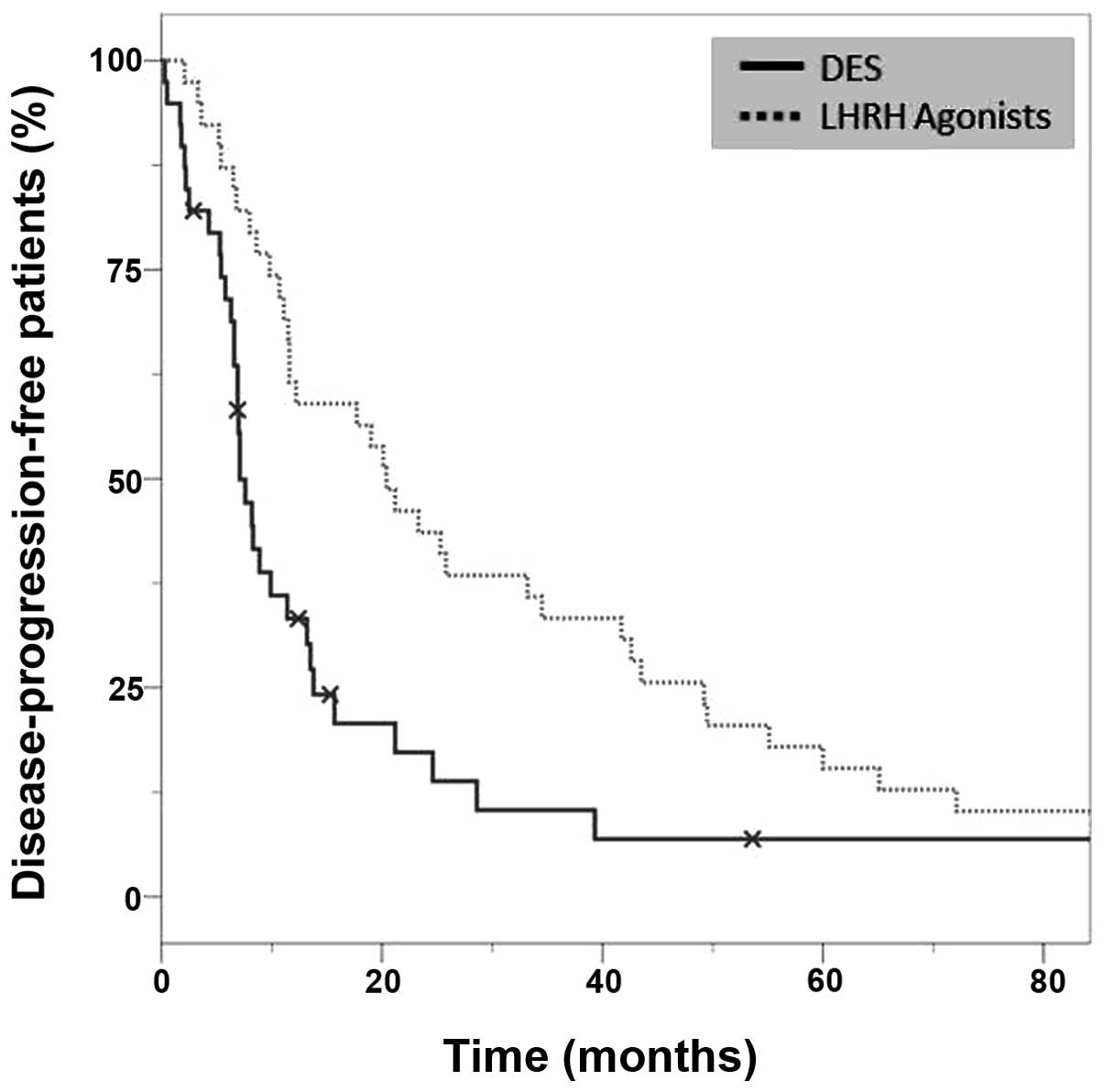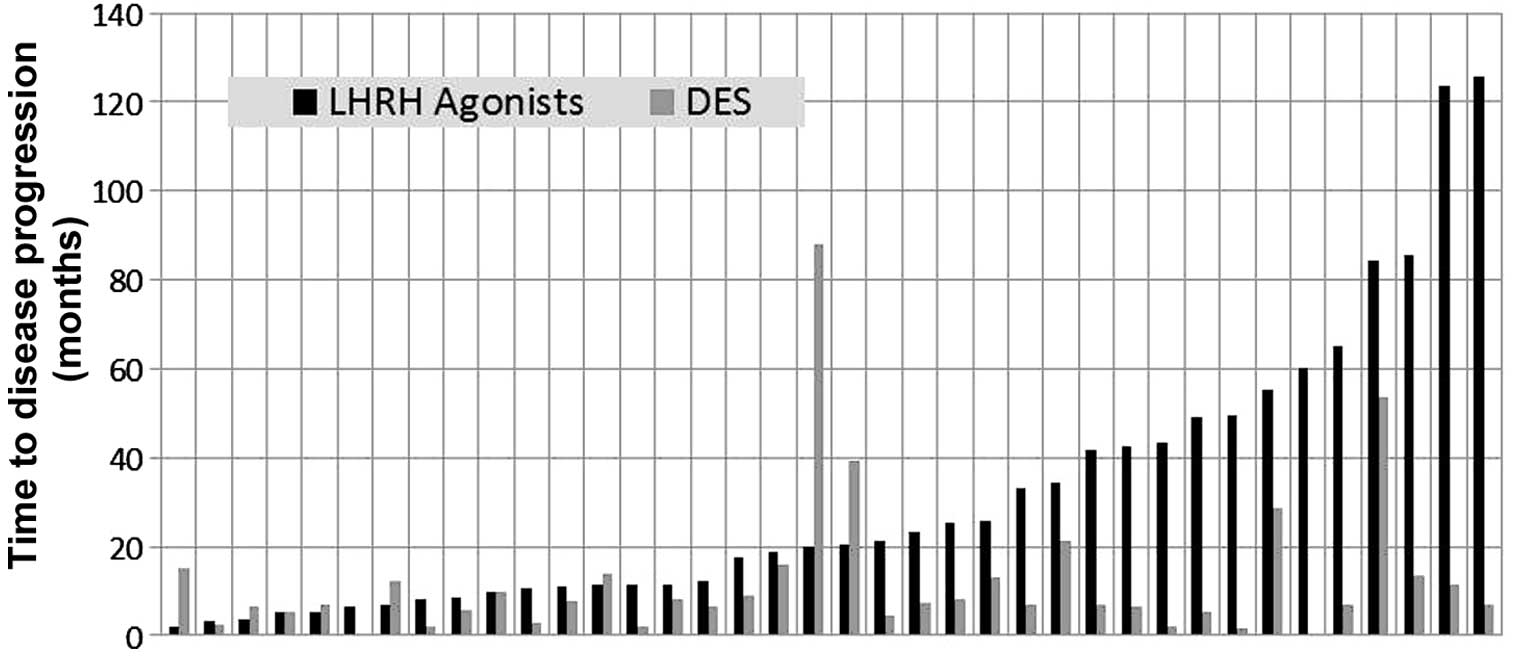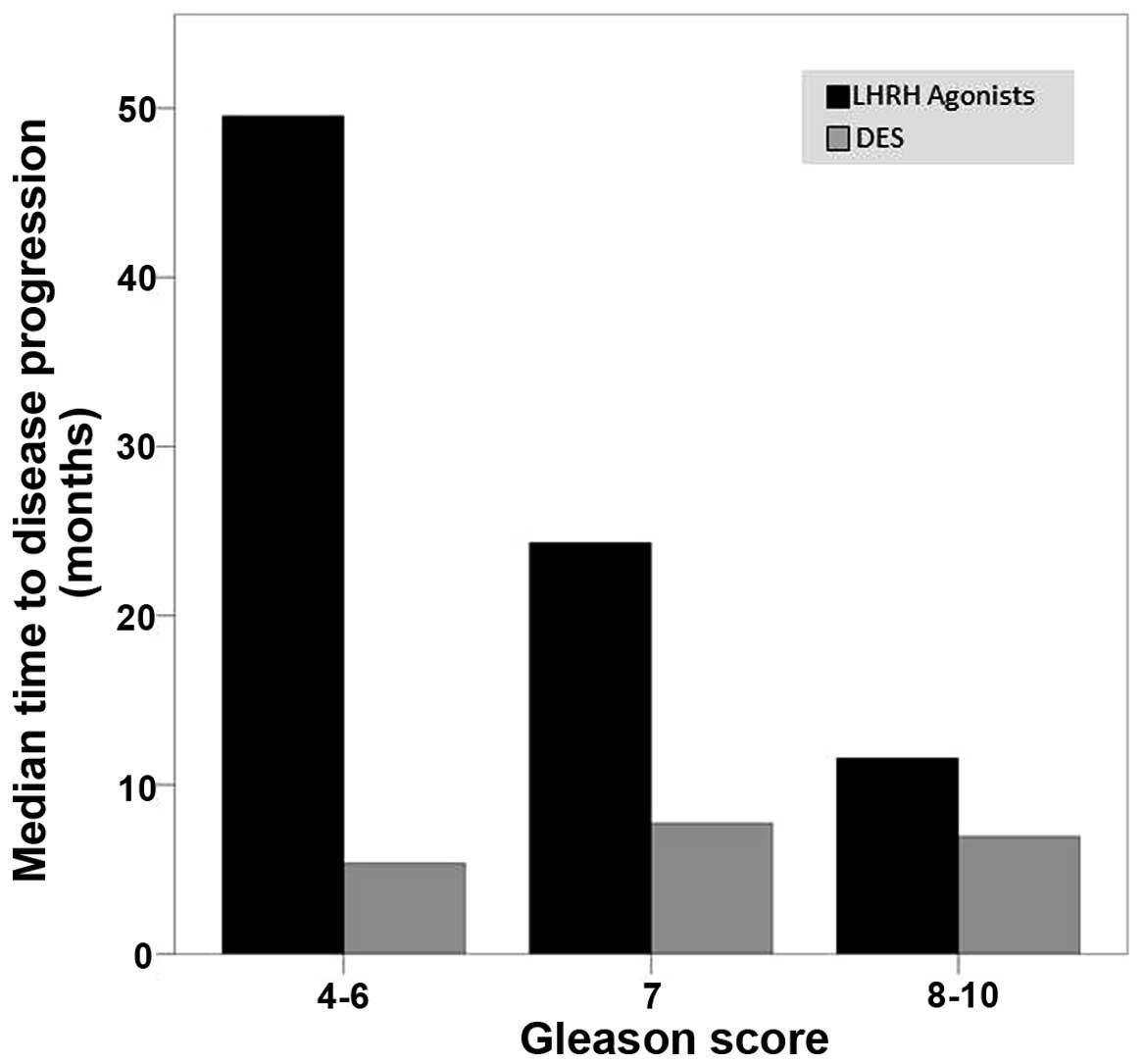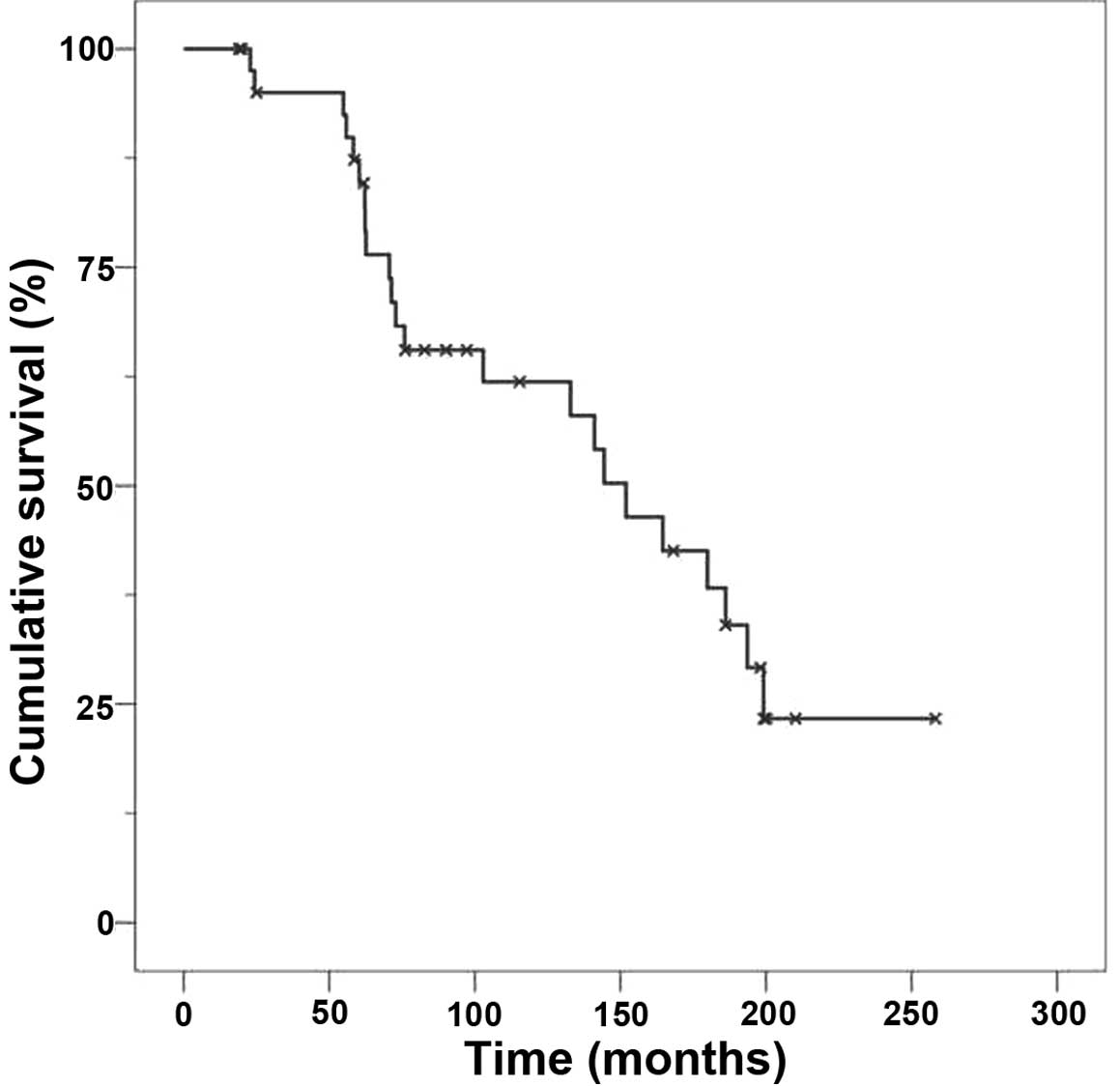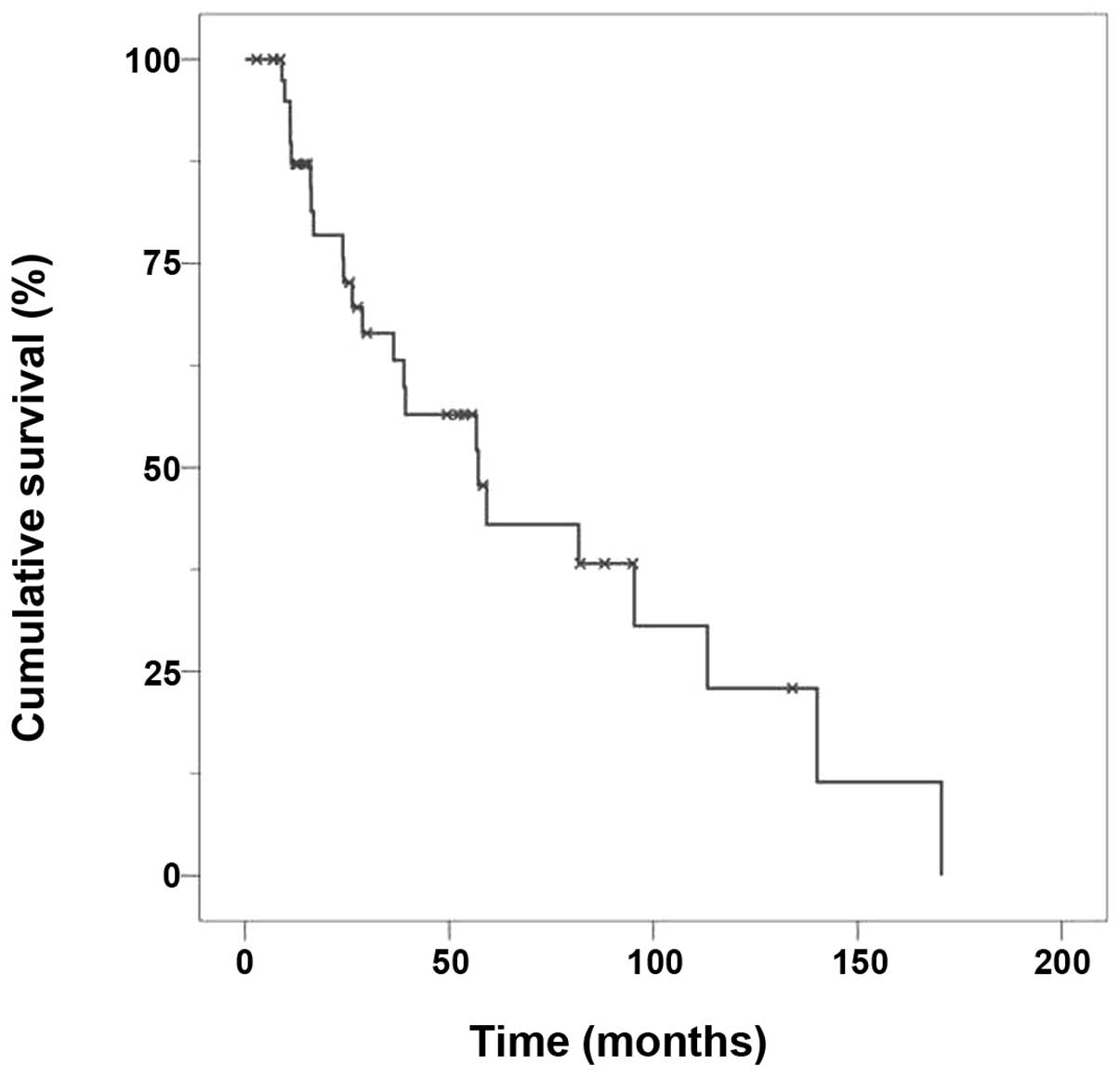|
1
|
Siegel R, DeSantis C, Virgo K, Stein K,
Mariotto A, Smith T, Cooper D, et al: Cancer treatment and
survivorship statistics. CA Cancer J Clin. 62:220–241. 2012.
View Article : Google Scholar
|
|
2
|
Huang X, Chau CH and Figg WD: Challenges
to improved therapeutics for metastatic castrate resistant prostate
cancer: from recent successes and failures. J Hematol Oncol.
5:352012. View Article : Google Scholar
|
|
3
|
Wilkins A, Shahidi M, Parker C, Gunapala
R, Thomas K, Huddart R, Horwich A, et al: Diethylstilbestrol in
castration-resistant prostate cancer. BJU Int. 110:E727–E735. 2012.
View Article : Google Scholar : PubMed/NCBI
|
|
4
|
Scher HI, Halabi S, Tannock I, Morris M,
Sternberg CN, Carducci M, et al: Design and end points of clinical
trials for patients with progressive prostate cancer and castrate
levels of testosterone: recommendations of the Prostate Cancer
Clinical Trials Working Group. J Clin Oncol. 26:1148–1159. 2008.
View Article : Google Scholar
|
|
5
|
Petrylak DP, Tangen CM, Hussain MH, Lara
PN, Jones JA, Taplin ME, Burch PA, et al: Docetaxel and
estramustine compared with mitoxantrone and prednisone for advanced
refractory prostate cancer. New Engl J Med. 351:1513–1520. 2004.
View Article : Google Scholar : PubMed/NCBI
|
|
6
|
Tannock IF, De Wit R, Berry WR, Horti J,
Pluzanska A, Chi KN, Oudard S, et al: Docetaxel plus prednisone or
mitoxantrone plus prednisone for advanced prostate cancer. New Engl
J Med. 351:1502–1512. 2004. View Article : Google Scholar : PubMed/NCBI
|
|
7
|
Locke JA, Guns ES, Lubik AA, Adomat HH,
Hendy SC, Wood CA, Ettinger SL, Gleave ME and Nelson CC: Androgen
levels increase by intratumoral de novo steroidogenesis
during progression of castration-resistant prostate cancer. Cancer
Res. 68:6407–6415. 2008.PubMed/NCBI
|
|
8
|
Montgomery RB, Mostaghel EA, Vessella R,
Hess DL, Kalhorn TF, Higano CS, True LD and Nelson PS: Maintenance
of intratumoral androgens in metastatic prostate cancer: a
mechanism for castration-resistant tumor growth. Cancer Res.
68:4447–4454. 2008. View Article : Google Scholar : PubMed/NCBI
|
|
9
|
Aggarwal R, Weinberg V, Small EJ, Oh W,
Rushakoff R and Ryan CJ: The mechanism of action of estrogen in
castration-resistant prostate cancer: clues from hormone levels.
Clin Genitourin Cancer. 7:E71–E76. 2009. View Article : Google Scholar : PubMed/NCBI
|
|
10
|
Huggis C and Hodges CV: Studies on
prostatic cancer. I The effects of castration, of estrogen and of
androgen injection on serum phosphatases in metastatic carcinoma of
the prostate. Cancer Res. 1:293–297. 1941.
|
|
11
|
Veterans Administration Cooperative
Urological Research Group. Carcinoma of the prostate: treatment
comparison. J Urol. 98:516–522. 1967.
|
|
12
|
Bosset PO, Albiges L, Seisen T, De la
Motte Rouge T, Phé V, Bitker MO and Rouprêt M: Current role of
diethylstilbestrol in the management of advanced prostate cancer.
BJU Int. 110:E826–E829. 2012. View Article : Google Scholar : PubMed/NCBI
|
|
13
|
Malkowicz SB: The role of
diethylstilbestrol in the treatment of prostate cancer. Urology.
58:108–113. 2001. View Article : Google Scholar : PubMed/NCBI
|
|
14
|
Kitahara S, Yoshida K, Ishizaka K,
Kageyama Y, Kawakami S, Tsujii T and Oshima H: Stronger suppression
of serum testosterone and FSH levels by a synthetic estrogen than
by castration or an LH-RH agonist. Endocr J. 44:527–532. 1997.
View Article : Google Scholar : PubMed/NCBI
|
|
15
|
Robinson MR, Smith PH, Richards B, Newling
DW, De Pauw M and Sylvester R: The final analysis of the EORTC
Genito-Urinary Tract Cancer Co-Operative Group phase III clinical
trial (protocol 30805) comparing orchidectomy, orchidectomy plus
cyproterone acetate and low dose stilboestrol in the management of
metastatic carcinoma of the prostate. Eur Urol. 28:273–283.
1985.
|
|
16
|
Montgomery B, Nelson PS, Vessella R,
Kalhorn T, Hess D and Corey E: Estradiol suppresses tissue
androgens and prostate cancer growth in castration resistant
prostate cancer. BMC Cancer. 10:2442010. View Article : Google Scholar : PubMed/NCBI
|
|
17
|
Rosenbaum E, Wygoda M, Gips M, Hubert A,
Tochner Z and Gabizon A: Diethylstilbestrol is an active agent in
prostatic cancer patients after failure to complete androgen
blockade. Proc J Clin Oncol. 19:349a2000.
|
|
18
|
Clemons J, Glodé LM, Gao D and Flaig TW:
Low-dose diethylstilbestrol for the treatment of advanced prostate
cancer. Urol Oncol. 31:198–204. 2013. View Article : Google Scholar : PubMed/NCBI
|
|
19
|
Shamash J, Stebbing J, Sweeney C, Sonpavde
G, Harland S, Dawkins G, Brock C, et al: A validated prognostic
index predicting response to dexamethasone and diethylstilbestrol
in castrate-resistant prostate cancer. Cancer. 116:3595–3602. 2010.
View Article : Google Scholar : PubMed/NCBI
|
|
20
|
Manikandan R, Srirangam SJ, Pearson E,
Brown SC, O’Reilly P and Collins GN: Diethylstilboestrol versus
bicalutamide in hormone refractory prostate carcinoma: a
prospective randomized trial. Urol Int. 75:217–221. 2005.
View Article : Google Scholar : PubMed/NCBI
|
|
21
|
Orlando M, Chacón M, Salum G and Chacón
DR: Low-dose continuous oral fosfestrol is highly active in
‘hormone-refractory’ prostate cancer. Ann Oncol. 11:177–181.
2000.PubMed/NCBI
|
|
22
|
Smith DC, Redman BG, Flaherty LE, Li L,
Strawderman M and Pienta KJ: A phase II trial of oral
diethylstilbesterol as a second-line hormonal agent in advanced
prostate cancer. Urology. 52:257–260. 1998. View Article : Google Scholar : PubMed/NCBI
|
|
23
|
Robertson CN, Roberson KM, Padilla GM,
O’Brien ET, Cook JM, Kim CS and Fine RL: Induction of apoptosis by
diethylstilbestrol in hormone-insensitive prostate cancer cells. J
Natl Cancer Inst. 88:908–917. 1996. View Article : Google Scholar : PubMed/NCBI
|
|
24
|
Hartley-Asp B, Deinum J and Wallin M:
Diethylstilbestrol induces metaphase arrest and inhibits
microtubule assembly. Mutat Res. 143:231–235. 1985. View Article : Google Scholar : PubMed/NCBI
|
|
25
|
Geier R, Adler S, Rashid G and Klein A:
The synthetic estrogen diethylstilbestrol (DES) inhibits the
telomerase activity and gene expression of prostate cancer cells.
Prostate. 70:1307–1312. 2010.PubMed/NCBI
|
|
26
|
Ho SM: Estrogens and anti-estrogens: key
mediators of prostate carcinogenesis and new therapeutic
candidates. J Cell Biochem. 91:491–503. 2004. View Article : Google Scholar : PubMed/NCBI
|
|
27
|
Schulz P, Link TA, Chaudhuri L and Fittler
F: Role of the mitochondrial bc1-complex in the cytotoxic action of
diethylstilbestrol-diphosphate toward prostatic carcinoma cells.
Cancer Res. 50:5008–5012. 1990.PubMed/NCBI
|
|
28
|
de Bono JS, Oudard S, Ozguroglu M, Hansen
S, Machiels JP, Kocak I, Gravis G, et al: Prednisone plus
cabazitaxel or mitoxantrone for metastatic castration-resistant
prostate cancer progressing after docetaxel treatment: a randomised
open-label trial. Lancet. 376:1147–1154. 2010.
|
|
29
|
Kantoff PW, Higano CS, Shore ND, Berger
ER, Small EJ, Penson DF, Redfern CH, Ferrari AC, Dreicer R, Sims
RB, Xu Y, Frohlich MW and Schellhammer PF; IMPACT Study
Investigators. Sipuleucel-T immunotherapy for castration-resistant
prostate cancer. New Engl J Med. 363:411–422. 2010. View Article : Google Scholar : PubMed/NCBI
|
|
30
|
Gerger A, Langsenlehner U, Kapp K and
Langsenlehner T: Overall survival benefit and safety profile of
radium-223 chloride, a first-in-class alpha-pharmaceutical: results
from a phase III randomized trial (ALSYMPCA) in patients with
castration-resistant prostate cancer (CRPC) with bone metastases. J
Clin Oncol. 30(Suppl 5): 82012.
|
|
31
|
Kmietowicz Z: NICE recommends abiraterone
for prostate cancer after manufacturer reduces price. BMJ.
344:e35202012. View Article : Google Scholar : PubMed/NCBI
|















